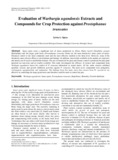| dc.description.abstract | Insect pests cause a significant loss of maize production in Africa. Maize weevil (Sitophilus zeamais Motchulsky) and the larger grain borer (Prostephanus truncatus Horn) are the most destructive insect pests of maize. Chemical control is the most commonly used and the most effective method at the farm level. However, some of the chemicals cause adverse effects to environment and humans. In addition, insecticides available in the market are expensive and mostly out of reach to smallholder farmers. The use of botanicals for pests and disease control is preferred because plant materials are non-toxic and are readily available. This study investigated the efficacy of extracts and compounds from Warbugia ugandensis leaves for control of P. truncatus infestation in stored maize. All the crude extracts exhibited repellent, toxicity and growth inhibition activities against P. truncates. The most active compounds were polygodial, warburganal, ugandensolide and mukaadial. The findings from this study show that extracts from W. ugandensis are effective in controlling the larger grain borer and therefore could be used to control the pest. | en_US |

